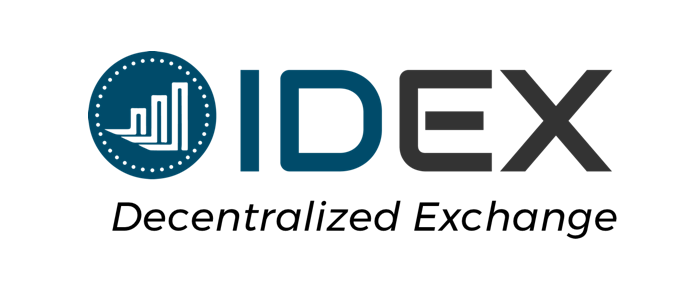
IDEX

Exchange Fees
Deposit Methods
Cryptos (278)
IDEX Review
What is IDEX?
IDEX is a “decentralized exchange” that launched in October 2016. It is the first Ethereum based decentralized smart contract exchange to support real-time trading. It claims to be the most advanced Ethereum DEX. It supports limit and market orders, gas-free cancels, and the ability to fill many trades at once.
The platform is available in English, Spanish, Russian, South Korean, Vietnamese and Mandarin.
How it Works
The exchange consists of a smart contract, a trading engine, and a “transaction processing arbiter”. The smart contract is responsible for storing all assets and executing trade settlement. The user has to verify all trades using the user’s private keys.
Unlike most other decentralized exchanges, IDEX has built a smart contract that only allows the exchange to submit signed trades to Ethereum. This enables the exchange to control the order in which transactions are processed, separating the act of trading from final settlement. As users trade, their exchange balances updates in real-time, while simultaneously they use their private keys used to authorize the trade in the contract. This authorization prevents users from rescinding any completed trades, and prevents the exchange from initiating any unauthorized trades.
US-investors
The exchange does not list US-investors as prohibited from trading, but US-investors should do their own independent assessment of any problems arising from their residency or citizenship.
Liquidity
The 24 hour trading volume at this platform is quite low. On the date of last updating this review (2 December 2021), the 24-hour trading volume was USD 7,803, according to Coinmarketcap. So if you looking for an exchange with deep liquidity, IDEX is definitely not the place for you.
IDEX Trading View
Different exchanges have different trading views. And there is no “this overview is the best”-view. You should yourself determine which trading view that suits you the best. What the views normally have in common is that they all show the order book or at least part of the order book, a price chart of the chosen cryptocurrency and order history. They normally also have buy and sell-boxes. Before you choose an exchange, try to have a look at the trading view so that you can ascertain that it feels right to you. The below is a picture of the trading view at IDEX:

IDEX Fees
IDEX Trading fees
Every trade occurs between two parties: the maker, whose order exists on the order book prior to the trade, and the taker, who places the order that matches (or “takes”) the maker’s order.
IDEX’s trading fees for takers are 0.25%. This fee is slightly above the global industry average spot trading taker fee, being 0.221% according to this report. IDEX does however offer a discount for makers who trade at 0.10%. This is beneficial for the investors who are not interested in picking up existing orders from the order book but rather prefers to “go fishing” with maker-orders.
IDEX Withdrawal fees
IDEX previously wrote on its site that “when withdrawing tokens the fee amount is calculated using the Token/ETH exchange rate from the last 10 trades.” However, to our understanding, the exchange now only charges the network fee when you withdraw crypto. This is a more consumer friendly withdrawal fee model than what is the industry average in the crypto industry.
Deposit Methods
IDEX does not accept any other deposit method than cryptocurrencies, so new crypto investors can’t actually trade at this exchange. If you don’t have any crypto but want to start trading here, you will first have to purchase cryptocurrencies from another exchange. Then, as a second step, you can deposit them here. You can do this easy though.
IDEX Security
The servers of decentralized exchanges normally spread out across the globe. This is different from centralized exchanges that normally have their servers more concentrated. This spread-out of servers leads to a lower risk of server downtime and also means that decentralized exchanges are virtually immune to attacks. This is because if you take out one of the servers, it makes little to no difference for the network of servers in its entirety. However, if you manage to get into a server at a centralized exchange, you can do a lot more harm.
Also, if you make a trade at a decentralized exchange, the exchange itself never touches your assets. Accordingly, even if a hacker would somehow be able to hack the exchange (in spite of the above), the hacker can not access your assets. If you make a trade at a centralized exchange, however, you normally hold assets at that exchange until you withdraw them to your private wallet. A hacker can therefore hack a centralized exchange and steal your funds held at such exchange. That is not possible in the same way when it comes to a DEX.